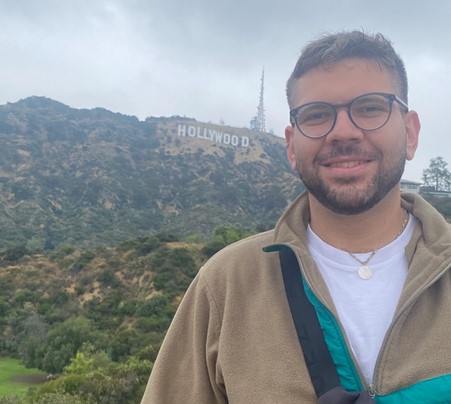While the NanoCarb project is coming to an end, some of our ESRs completed their PhD and are now moving on with their research career. In the coming weeks, you will read here a series of interviews with our NanoCarb alumni.
The first interview is with Dr Panagiotis Georgiou, who completed his PhD last year within the Gibson group at the University of Warwick and is now doing a postdoctoral fellowship at UCLA in Los Angeles, California.
What has your research project focused on and what are your key results and innovations coming from your research project?
As part of the NanoCarb project, my primary role was to design glycosylated nanomaterials based on gold and polymer hybrids to be used as point-of-care diagnostic tools. The key findings of my research were to identify polymer ligands with glycans to one end to carefully tune their response towards binding with analyte targets. The concepts introduced were then applied in COVID-19 diagnostics during the pandemic, by deploying glycosylated, anisotropic gold nanorods to probe the glycan binding of SARS-CoV-2 spike protein.
What impact do your research project and your outcomes have?
The modular nature of using polymeric tethers to assemble glycans into plasmonic sensors highlights their potential for other infections for diagnostics or to gain a basic understanding of pathogen-glycan interactions. This technology has also been used by our group to design a lateral flow device system based only on carbohydrates (“antibody-free”) as sensing units, highlighting that glycans can be used to target SARS-COV-2.
What were your personal highlights over the course of your research project?
The work we published in ACS Macro Letters (ACS Macro Lett. 2022, 11, 317−322) was recognised by the journal as ACS Editor’s choice and highlighted in the journal’s Top 20 most accessed articles and featured on the front cover.
Are there any elements of the training you received that you find should be integrated into local doctoral programmes?
The career development workshops organised throughout this program have been beneficial personally and professionally and I believe all doctoral programmes should integrate that kind of training. Special thanks to our coach, Dr Helen Williamson from Horizons Unleashed, for her valuable guidance in producing our own personal and career development plans.
How did the NanoCarb network impact your doctoral experience?
Being part of a large consortium was critical to having a fruitful doctoral course with multiple outputs, by working on multiple collaborative projects and being able to exchange knowledge with scientists across the areas of chemistry, biology and pharmacy. Key collaborators across this program include Prof Andreas Heise, Dr Inge Nelissen, Dr Nicola Judge and Dr Alessia Pancaro.
What are you currently up to?
Since the completion of my PhD course, I have moved to the United States to start my postdoctoral fellowship at UCLA, currently working with polymer-protein therapeutics for the treatment of hypoglycaemia in type-1 diabetes.
We wish Panos all the best with his new life in the US! Stay tuned for more interviews in the coming weeks.
